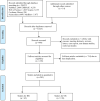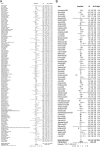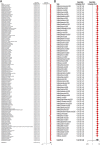A meta-analysis on the risk factors adjusted association between cardiovascular disease and COVID-19 severity
- PMID: 34380456
- PMCID: PMC8355578
- DOI: 10.1186/s12889-021-11051-w
A meta-analysis on the risk factors adjusted association between cardiovascular disease and COVID-19 severity
Abstract
Background: Cardiovascular disease (CVD), one of the most common comorbidities of coronavirus disease 2019 (COVID-19), has been suspected to be associated with adverse outcomes in COVID-19 patients, but their correlation remains controversial.
Method: This is a quantitative meta-analysis on the basis of adjusted effect estimates. PubMed, Web of Science, MedRxiv, Scopus, Elsevier ScienceDirect, Cochrane Library and EMBASE were searched comprehensively to obtain a complete data source up to January 7, 2021. Pooled effects (hazard ratio (HR), odds ratio (OR)) and the 95% confidence intervals (CIs) were estimated to evaluate the risk of the adverse outcomes in COVID-19 patients with CVD. Heterogeneity was assessed by Cochran's Q-statistic, I2test, and meta-regression. In addition, we also provided the prediction interval, which was helpful for assessing whether the variation across studies was clinically significant. The robustness of the results was evaluated by sensitivity analysis. Publication bias was assessed by Begg's test, Egger's test, and trim-and-fill method.
Result: Our results revealed that COVID-19 patients with pre-existing CVD tended more to adverse outcomes on the basis of 203 eligible studies with 24,032,712 cases (pooled ORs = 1.41, 95% CIs: 1.32-1.51, prediction interval: 0.84-2.39; pooled HRs = 1.34, 95% CIs: 1.23-1.46, prediction interval: 0.82-2.21). Further subgroup analyses stratified by age, the proportion of males, study design, disease types, sample size, region and disease outcomes also showed that pre-existing CVD was significantly associated with adverse outcomes among COVID-19 patients.
Conclusion: Our findings demonstrated that pre-existing CVD was an independent risk factor associated with adverse outcomes among COVID-19 patients.
Keywords: Coronavirus disease 2019; adjusted effect estimate; adverse outcome; cardiovascular disease.
© 2021. The Author(s).
Conflict of interest statement
The authors declare not any potential conflict of interest.
Figures




References
-
- Cummings MJ, Baldwin MR, Abrams D, Jacobson SD, Meyer BJ, Balough EM, et al. Epidemiology, clinical course, and outcomes of critically ill adults with COVID-19 in New York City: a prospective cohort study. Lancet (London, England) 2020;395(10239):1763–1770. doi: 10.1016/S0140-6736(20)31189-2. - DOI - PMC - PubMed
Publication types
MeSH terms
Grants and funding
LinkOut - more resources
Full Text Sources
Medical

